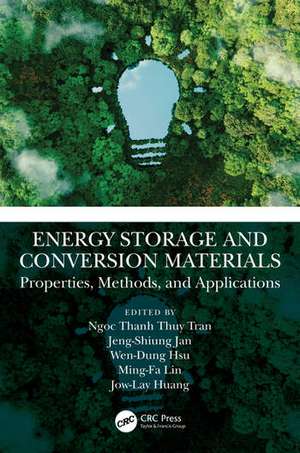Energy Storage and Conversion Materials
Editat de Jeng-Shiung Jan, Jow-Lay Huang, Ming-Fa Lin, Ngoc Thanh Thuy Tran, Wen-Dung Hsuen Limba Engleză Paperback – 19 dec 2024
| Toate formatele și edițiile | Preț | Express |
|---|---|---|
| Paperback (1) | 377.08 lei 3-5 săpt. | +22.48 lei 4-10 zile |
| Taylor & Francis Ltd. – 19 dec 2024 | 377.08 lei 3-5 săpt. | +22.48 lei 4-10 zile |
| Hardback (1) | 1008.02 lei 6-8 săpt. | |
| CRC Press – 3 mai 2023 | 1008.02 lei 6-8 săpt. |
Preț: 377.08 lei
Preț vechi: 409.87 lei
-8% Nou
Puncte Express: 566
Preț estimativ în valută:
72.16€ • 78.36$ • 60.62£
72.16€ • 78.36$ • 60.62£
Carte disponibilă
Livrare economică 01-15 aprilie
Livrare express 15-21 martie pentru 32.47 lei
Preluare comenzi: 021 569.72.76
Specificații
ISBN-13: 9781032434223
ISBN-10: 1032434228
Pagini: 384
Dimensiuni: 235 x 158 x 23 mm
Greutate: 0.5 kg
Editura: Taylor & Francis Ltd.
ISBN-10: 1032434228
Pagini: 384
Dimensiuni: 235 x 158 x 23 mm
Greutate: 0.5 kg
Editura: Taylor & Francis Ltd.
Notă biografică
Ngoc Thanh Thuy Tran obtained her Ph.D. in Physics in 2017 from the National Cheng Kung University (NCKU), Taiwan. Afterward, she began to work as a postdoctoral researcher and then an assistant researcher at Hierarchical Green-Energy Materials (Hi-GEM) Research Center, NCKU. Her scientific interest is focused on the fundamental (electronic, magnetic, and thermodynamic) properties of 2D materials and rechargeable battery materials by means of the first-principles calculations.
Jeng-Shiung Jan is a professor in the Department of Chemical Engineering, NCKU, Taiwan. He received his PhD in Chemical Engineering in 2006 from Texas A&M University and conducted postdoctoral research at Georgia Institute of Technology. His current research focuses on studying the synthesis of functional polymers and nanomaterials. He received several awards, including Outstanding Professor in Academic Research from LCY Education Foundation and Lai Zaide Professor Award.
Wen-Dung Hsu is a professor in the Department of Materials Science and Engineering, NCKU, Taiwan. His expertise is utilizing computational materials science methods including first-principle calculations, molecular dynamics simulations, Monte-Carlo methods, and finite-element methods to study materials issues. His research interests are mechanical properties of materials from atomic to macro scale, lithium-ion battery, solid-oxide fuel cell, ferroelectrics, solid catalyst design for biodiesel, and processing design for single-crystal growth.
Ming-Fa Lin is a distinguished professor in the Department of Physics, NCKU, Taiwan. He received his PhD in physics in 1993 from the National Tsing-Hua University, Taiwan. His main scientific interests focus on essential properties of carbon-related materials and low-dimensional systems. He is a member of American Physical Society, American Chemical Society, and the Physical Society of Republic of China (Taiwan).
Jow-Lay Huang is working as a chair professor in the Department of Materials Science and Engineering, NCKU, Taiwan. He is the director of the Hierarchical Green-Energy Materials (Hi-GEM) Research Center, NCKU. He received his PhD in Materials Science and Engineering in 1983 from University of Utah. His research interest includes the fabrication, development and application of ceramic nanocomposites, piezo-phototronic thin films for photodetector devices, piezoelectric thin films for high frequency devices, metal oxide/graphene and SiCx nanocomposites as anode materials for lithium-ion battery, and 2D nanocrystal materials for photoelectrochemical application.
Jeng-Shiung Jan is a professor in the Department of Chemical Engineering, NCKU, Taiwan. He received his PhD in Chemical Engineering in 2006 from Texas A&M University and conducted postdoctoral research at Georgia Institute of Technology. His current research focuses on studying the synthesis of functional polymers and nanomaterials. He received several awards, including Outstanding Professor in Academic Research from LCY Education Foundation and Lai Zaide Professor Award.
Wen-Dung Hsu is a professor in the Department of Materials Science and Engineering, NCKU, Taiwan. His expertise is utilizing computational materials science methods including first-principle calculations, molecular dynamics simulations, Monte-Carlo methods, and finite-element methods to study materials issues. His research interests are mechanical properties of materials from atomic to macro scale, lithium-ion battery, solid-oxide fuel cell, ferroelectrics, solid catalyst design for biodiesel, and processing design for single-crystal growth.
Ming-Fa Lin is a distinguished professor in the Department of Physics, NCKU, Taiwan. He received his PhD in physics in 1993 from the National Tsing-Hua University, Taiwan. His main scientific interests focus on essential properties of carbon-related materials and low-dimensional systems. He is a member of American Physical Society, American Chemical Society, and the Physical Society of Republic of China (Taiwan).
Jow-Lay Huang is working as a chair professor in the Department of Materials Science and Engineering, NCKU, Taiwan. He is the director of the Hierarchical Green-Energy Materials (Hi-GEM) Research Center, NCKU. He received his PhD in Materials Science and Engineering in 1983 from University of Utah. His research interest includes the fabrication, development and application of ceramic nanocomposites, piezo-phototronic thin films for photodetector devices, piezoelectric thin films for high frequency devices, metal oxide/graphene and SiCx nanocomposites as anode materials for lithium-ion battery, and 2D nanocrystal materials for photoelectrochemical application.
Cuprins
1. Introduction, 2. Molecular Dynamics Simulation of Amorphous Silicon Anode in Li-Ion Batteries, 3. Rich Intercalations in Graphite Magnesium Compounds, 4. Na-Intercalation Compounds and Na-Ion Batteries, 5. Electronic Properties of LiLaTiO4 Compound, 6. Electronic Properties of Li2S-Si Heterojunction, 7. Electronic and Magnetic Properties of LiMnO2 Compound, 8. Surface Property of High-Voltage Cathode LiNiPO4 in Lithium-Ion Batteries: A First-Principles Study, 9. Introductory to Machine Learning Method and Its Applications in Li-Ion Batteries, 10. SnOx (x = 0,1,2) and Mo Doped SnO2 Nanocomposite as Possible Anode Materials in Lithium-Ion Battery, 11. Polymer Electrolytes Based on Ionic Liquid and Poly(ethylene glycol) via in-situ Photopolymerization of Lithium-Ion Batteries, 12. Synthesis of Multiporous Carbons with Biomaterials for Applications in Supercapacitors and Capacitive Deionization, 13. Low-Dimensional Heterostructure-Based Solar Cells, 14. Towards High-Performance Indoor Dye-Sensitized Photovoltaics: A Review of Electrodes and Electrolytes Development, 15. Progress and Prospects of Intermediate-Temperature Solid Oxide Fuel Cells, 16. Concluding Remarks, 17. Energy Resources and Challenges, 18. Problems under Classical and Quantum Pictures
